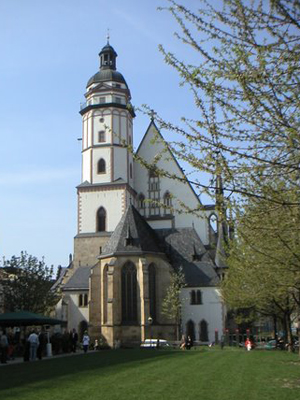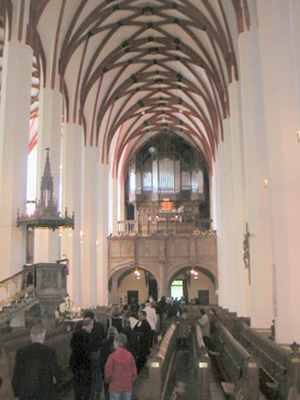| |
 |
 |
 |
| Comment on this report, or find other reports. |
 |
| Our Mystery Worshippers are volunteers who warm church pews for us around the world. If you'd like to become a Mystery Worshipper, start here. |
 |
| Find out how to reproduce this report in your church magazine or website. |
|
|
| 1719: Thomaskirche,
Leipzig, Germany |
 |
 |
 |
Mystery
Worshipper: Texprof.
The church:
Thomaskirche,
Leipzig, Germany.
Denomination:
Evangelical
Lutheran Church in Saxony.
The building:
The current late Gothic building was erected in 1496 and the
tower in 1537. Renovated, repaired and reconstructed countless
times over the years, the Thomaskirche of today is not exactly
the one that Martin Luther and Johann Sebastian Bach knew, although
much has been preserved. After the reunification of Germany
in 2000, the entire church was restored. The exterior, in white
and grey, has perhaps been restored a bit too well, giving it
an almost surrealistic appearance. The interior features two
opposing choir galleries and seems well suited for music. The
baptismal font is the one at which several of Bach's children
were baptised, as well as the infant Richard Wagner. Karl Marx
and Friedrich Engels also stood before this same font as godfathers
to Karl Liebknecht, co-founder of the Communist Party of Germany.
The church:
The Thomaskirche is well-known in Leipzig and famous throughout
the world as the church where Bach served as music director
for 27 years. For almost 800 years, the world famous St Thomas
Boys Choir has been resident at the church. Martin Luther preached
here on Whitsunday 1539. In modern times the church continues
to maintain a lively music curriculum, but also serves the community
with programs for all ages as well as with a social outreach.
The neighbourhood:
From its earliest beginnings in the 11th century, Leipzig has
been an important centre of commerce. It is home to the University
of Leipzig, founded in 1409, one of Europe's oldest universities.
Heavily damaged by Allied bombing during World War II, the city
was restored under the communist policies of East Germany. The
skyline of the modern city now includes the university tower
and new hotels and commercial and residential buildings. Within
the city, former woodlands along the riverbanks have been partly
converted to parks. The church is across from the Market and
the Rathaus, in other words at the very centre of the city.
The cast:
The preacher was the Revd Landesbischof Jochen Bohl, Bishop
of Saxony. The celebrant was the church's pastor, the Revd Christian
Wolff.
The date & time:
Easter Sunday, 12 April 2009, 9.30am.
What was the name of the service?
Morning Worship.
How full was the building?
The church seats about 1,500. We arrived one-half hour early
but the place was already packed.
Did anyone welcome you personally?
As we entered, a person gave us a hymnal and program and extended
a greeting. The pastor spoke some words of welcome, but with
1,500 worshippers he could not recognise everyone personally.
Was your pew comfortable?
Traditional German churches have wood pews with a kneeler (under
which is often a heating element for winter season) and a rack
on which to place the hymnal. It's not plush, but not uncomfortable.
How would you describe
the pre-service atmosphere?
The pre-service time was filled with organ music so the arriving
worshippers were quiet. There are two organs, a romantic organ
in the west balcony and a baroque organ on the north wall.
What were the exact opening
words of the service?
Christus ist erstanden! Er ist wahrhaftig erstanden!
(Christ is risen! He is risen indeed!)
What books did the congregation
use during the service?
The hymnal and a service program.
What musical instruments
were played?
There were significant organ offerings, such as the prelude,
voluntary at the offering, and the postlude (for which all remained
seated). However, on this Sunday, the St Thomas Boys Choir sang
the Easter portion of Handel's Messiah in German, accompanied
by the famed Gewandhaus Orchestra.

Did anything distract
you?
New visitors to a church might pay more attention to figurative
symbols such as stained glass windows than would those who are
present each Sunday. As a visual learner, I spent too much time
trying to figure out what was going on in all the windows, each
of which was different in style and motif.
Was the worship stiff-upper-lip, happy clappy, or
what?
German worship follows a liturgy, so it is formal. The music,
however, was glorious, so even if there was no hand-clapping,
there were exultant spirits celebrating. German clergy have
a certain unique way of moving about during a service – indeed, the Germans have a special word for it, similar to the
English word "stride" – and when the bishop
walked from the congregation to the high altar to give the benediction
at the end of the service, his very formal stride was evident
and most interesting.
Exactly how long was the sermon?
21 minutes.
On a scale of 1-10, how good was the preacher?
9 – The bishop was a self-contained personality. He had
no use for laughter or outbursts of passion. It was a restrained,
reflective and meaningful presentation.
In a nutshell, what was the sermon
about?
The sermon was based on Luke 24:13-35 (on the road to Emmaus
the resurrected Christ appears to two disciples, who do not
recognise him). We live in a world as the disciples did, when
financial and political upheavals make us question the future.
After the crucifixion, the disciples also wondered whether they
had any future. However, the resurrection introduces us to a
new world and a new future in which confidence and victory are
our assurance.
Which part of the service was like being in
heaven?
When the 100 voice St Thomas Choir sang Handel's Wurdig
ist der Lamb from the west balcony accompanied by the Gewandhaus
Orchestra, it was as if heaven's gates opened.
And which part was like being in... er... the other place?
It was announced at communion that the first three groups to
approach the altar would have wine, but the rest would have
grape juice. Germans are fairly orderly, but the communion service
was extremely chaotic. You had to be careful that you did not
fall down the stairs as you attempted to exit through the press
of the crowd.
What happened when you hung around after the service looking lost?
We took the opportunity to ask people about some things and
they were very friendly.
How would you describe the after-service
coffee?
The building has no facilities for this sort of thing. Besides,
on Easter Sunday everyone had places to go.
How would you feel about making this church your regular (where 10 = ecstatic, 0 = terminal)?
10 – The musical tradition in this place is glorious and
the pastor seems to be very personable with his congregation.
He has been there for many years. His style is friendly and
approachable, so I suspect he is well loved by the members of
the parish.
Did the service make you
feel glad to be a Christian?
Easter Sunday at the Thomaskirche is perhaps an unfair example
to use in answer to this question, but one is left wanting to
shout in the streets: Er ist wahrhaftig auferstanden!
What one thing will you
remember about all this in seven days' time?
Being watched by Nicholas Selnecker (b. 1532), organist, hymnwiter,
preacher, theologian, one of six preparers of the historic doctrinal
standard of the Lutheran Church, the Book of Concord,
who looked down on me from an oil painting on the wall. |
|
|
 |
 |
 |
| We rely on voluntary donations to stay online. If you're a regular visitor to Ship of Fools, please consider supporting us. |
 |
 |
 |
| The Mystery Pilgrim |
 |
| One of our most seasoned reporters makes the Camino pilgrimage to Santiago de Compostela in Spain. Read here. |
 |
 |
 |
| London churches |
 |
| Read reports from 70 London churches, visited by a small army of Mystery Worshippers on one single Sunday. Read here. |
| |
|
|
|
|


